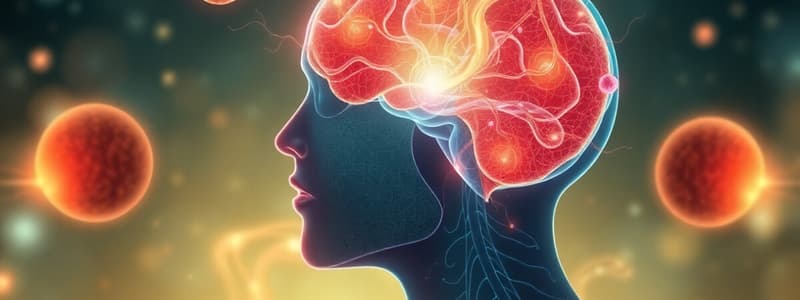Podcast
Questions and Answers
What type of cells are responsible for supporting, nourishing, and protecting neurons?
What type of cells are responsible for supporting, nourishing, and protecting neurons?
- Motor Neurons
- Interneurons
- Glial Cells (correct)
- Sensory Neurons
In a reflex action, which neurons directly communicate with muscles to produce a response?
In a reflex action, which neurons directly communicate with muscles to produce a response?
- Sensory Neurons
- Interneurons
- Glial Cells
- Motor Neurons (correct)
What part of the nervous system is responsible for the fight-or-flight response?
What part of the nervous system is responsible for the fight-or-flight response?
- Autonomic Nervous System
- Peripheral Nervous System
- Central Nervous System
- Sympathetic Nervous System (correct)
When playing a video game, which type of neurons facilitate the quick response to visual stimuli?
When playing a video game, which type of neurons facilitate the quick response to visual stimuli?
Which neurons carry sensory information to the central nervous system?
Which neurons carry sensory information to the central nervous system?
In an emergency situation, which system slows down bodily functions to conserve energy post-crisis?
In an emergency situation, which system slows down bodily functions to conserve energy post-crisis?
Which type of neuron is primarily responsible for communication within the central nervous system?
Which type of neuron is primarily responsible for communication within the central nervous system?
Which neurons are primarily responsible for sending commands from the brain to the skeletal muscles?
Which neurons are primarily responsible for sending commands from the brain to the skeletal muscles?
What is the role of the central nervous system?
What is the role of the central nervous system?
Which subsystem of the nervous system is responsible for transmitting sensory information to the CNS?
Which subsystem of the nervous system is responsible for transmitting sensory information to the CNS?
Which branch of the autonomic nervous system is responsible for the body's 'fight or flight' response?
Which branch of the autonomic nervous system is responsible for the body's 'fight or flight' response?
Which part of the nervous system is primarily involved in involuntary actions?
Which part of the nervous system is primarily involved in involuntary actions?
What is the primary function of the spinal cord within the central nervous system?
What is the primary function of the spinal cord within the central nervous system?
What does the peripheral nervous system primarily consist of?
What does the peripheral nervous system primarily consist of?
Which of the following is a characteristic of the sympathetic nervous system?
Which of the following is a characteristic of the sympathetic nervous system?
What is the main function of the autonomic nervous system?
What is the main function of the autonomic nervous system?
What is the primary focus of the psychology study mentioned?
What is the primary focus of the psychology study mentioned?
What method was used to assess participants' feelings of hunger and fullness?
What method was used to assess participants' feelings of hunger and fullness?
Which of the following best represents the operational definition of the dependent variable in this study?
Which of the following best represents the operational definition of the dependent variable in this study?
What physiological markers were measured in the study?
What physiological markers were measured in the study?
What type of stimuli were participants exposed to in the study?
What type of stimuli were participants exposed to in the study?
What was the goal of the researchers in this study?
What was the goal of the researchers in this study?
Which of the following outcomes was NOT part of the study's measurements?
Which of the following outcomes was NOT part of the study's measurements?
How did the researchers operationally define appetite regulation?
How did the researchers operationally define appetite regulation?
Flashcards
Central Nervous System (CNS)
Central Nervous System (CNS)
The command center of the body, including the brain and spinal cord, responsible for processing information and regulating bodily functions.
Spinal Cord
Spinal Cord
A vital pathway for transmitting sensory information to the brain and motor commands from the brain to the body.
Peripheral Nervous System (PNS)
Peripheral Nervous System (PNS)
The communication network outside of the brain and spinal cord, transmitting sensory information to the CNS.
Autonomic Nervous System
Autonomic Nervous System
Signup and view all the flashcards
Sympathetic Nervous System
Sympathetic Nervous System
Signup and view all the flashcards
Nerves
Nerves
Signup and view all the flashcards
Neurons
Neurons
Signup and view all the flashcards
Nervous System
Nervous System
Signup and view all the flashcards
Operational Definition of Appetite Regulation
Operational Definition of Appetite Regulation
Signup and view all the flashcards
Dependent Variable
Dependent Variable
Signup and view all the flashcards
Food Intake Manipulation
Food Intake Manipulation
Signup and view all the flashcards
Hypothalamus Role
Hypothalamus Role
Signup and view all the flashcards
Self-Report Measures
Self-Report Measures
Signup and view all the flashcards
Physiological Markers
Physiological Markers
Signup and view all the flashcards
Stimuli Effect on Appetite
Stimuli Effect on Appetite
Signup and view all the flashcards
Psychology Research Study
Psychology Research Study
Signup and view all the flashcards
Reflex Action
Reflex Action
Signup and view all the flashcards
Homunculus
Homunculus
Signup and view all the flashcards
Two-Point Discrimination
Two-Point Discrimination
Signup and view all the flashcards
Glial Cells
Glial Cells
Signup and view all the flashcards
Sensory Neurons
Sensory Neurons
Signup and view all the flashcards
Rapid Communication
Rapid Communication
Signup and view all the flashcards
Interneurons
Interneurons
Signup and view all the flashcards
Motor Neurons
Motor Neurons
Signup and view all the flashcards
Study Notes
Operational Definition of Dependent Variables
- The dependent variable in the study is appetite regulation.
- It is measured by participant's food intake in response to stimuli.
- Self-reported feelings of hunger and fullness are also part of the measurement.
- Physiological markers, like hormone levels, are quantified.
Nervous System
- The nervous system is the body's communication network.
- It consists of a complex system of nerves, neurons, and specialized cells.
Central Nervous System (CNS)
- The CNS comprises the brain and spinal cord.
- It functions as the body's command center.
- It processes information, coordinates responses, and regulates bodily functions.
- The spinal cord acts as a vital pathway for transmitting sensory information and motor commands between the body and brain.
Peripheral Nervous System (PNS)
- The PNS consists of all the nerves and ganglia located outside the brain and spinal cord.
- It acts as a communication network, transmitting sensory information from the body to the CNS.
Autonomic Nervous System
- This division of the PNS regulates involuntary bodily functions.
- It operates automatically, without conscious control.
- It has two main branches: the sympathetic and parasympathetic systems.
Sympathetic Nervous System
- It activates the body's "fight or flight" response during stress or danger.
- It increases heart rate, dilates airways, and redirects blood flow to essential organs.
Parasympathetic Nervous System
- It promotes relaxation and restores the body to a calm state after experiencing stress or danger.
- It slows heart rate, constricts airways, and enhances digestion.
Somatic Nervous System
- This PNS division controls voluntary movements and relays sensory information.
- It is responsible for coordinating voluntary movements, including those involved in skilled activities like playing a musical instrument, as well as for relaying sensory information.
Neurons
- Neurons are specialized cells that serve as the building blocks of the nervous system.
- They transmit electrical and chemical signals throughout the body.
- They consist of a cell body (soma), dendrites, and an axon.
Glial Cells
- Glial cells are support cells in the nervous system.
- They provide structural support, insulation, and nourishment to neurons.
- They play essential roles in maintaining brain health and supporting neuronal functions.
Motor Neurons
- Motor neurons transmit signals from the CNS to muscles, glands, and organs, enabling voluntary and involuntary movements.
Sensory Neurons
- Sensory neurons detect various stimuli (touch, temperature).
- They send signals to the CNS.
- These neurons convert stimuli into electrical signals that the brain processes.
Interneurons
- Interneurons function as connectors within the CNS.
- They relay signals between sensory and motor neurons, coordinating movement.
Reflex Arc
- The reflex arc controls reflex actions.
- Reflex actions are automatic responses to sensory stimuli, occurring without conscious thought.
- Sensory neurons detect stimuli, transmit signals to the spinal cord, where interneurons relay this information to motor neurons.
- Motor neurons trigger quick muscle responses.
Homunculus Mapper
- The homunculus mapper is a brain map of the body on the cortex.
- The mapping isn't proportional to the body parts' actual size.
- It can be used to test sensitivity using two-point discrimination.
Studying That Suits You
Use AI to generate personalized quizzes and flashcards to suit your learning preferences.




